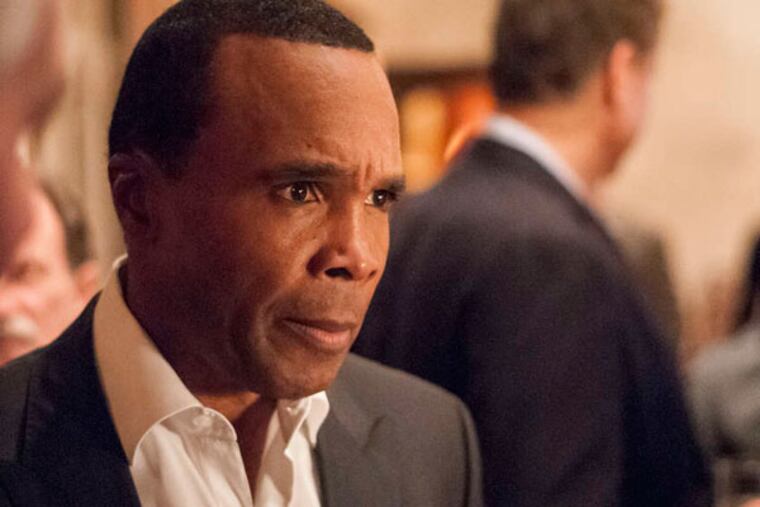Championing the cause of child sex abuse
'I'm a man. I'm a champion. I didn't want to look weak." Weak is not a word usually associated with five-time world boxing champion Sugar Ray Leonard. But as a survivor of child sexual abuse, a secret Leonard concealed for more than 40 years, he feared people might view him differently if he ever disclosed it.

'I'm a man. I'm a champion. I didn't want to look weak."
Weak is not a word usually associated with five-time world boxing champion Sugar Ray Leonard. But as a survivor of child sexual abuse, a secret Leonard concealed for more than 40 years, he feared people might view him differently if he ever disclosed it.
"I knew something was wrong," he says. "I drank to numb and cushion what I was hiding. When people see me, they see a champion who kicked [Roberto] Duran's butt, but the kid inside me was still living, and I didn't know how to find comfort."
A compact 57-year-old with a soft voice and forthright delivery, Leonard was in Wyndmoor last weekend to kick off a $25 million campaign for the Let Go . . . Let Peace Come In Foundation. He was also welcomed as a new board member of the group devoted to helping adult survivors of child abuse.
Led by businessman Peter Pelullo, 62, who hid his own abuse for more than 50 years, the group was founded in April 2008 and has donated $250,000 to the Johns Hopkins Bloomberg School of Public Health for research into the causes, prevention, and health issues of childhood sexual abuse. The foundation, which also provides subsidies for trauma therapy for affected individuals, was recently called in to help two young men involved in the Pennsylvania State University child-abuse scandal.
Pelullo hopes to raise more money for a network of 1,000 rooms across the country where survivors can gather and confer with a specialist.
"There's so much stigma around this issue," Pelullo says. "You believe that you're responsible for what happened. It leads to tics, shame, and addictions."
About 19 percent of girls and 9 percent of boys have suffered some sort sexual abuse by age 18, says Elizabeth Letourneau, founding director of the Moore Center for the Prevention of Child Sexual Abuse at the Bloomberg School. But the good news is the rate of child abuse has dipped considerably since 1990, with a 40 percent to 50 percent reduction, according to U.S. Department of Justice data.
"Efforts to bring abuse out of the shadows and educating people about the problem have all had an effect," Letourneau says. "It's something people aren't aware of, but it's very well-established."
When Leonard met Pelullo, they bonded over their shared experience. Although Leonard was immediately willing to be connected to Pelullo's project, he says he faced strong opposition from agents, attorneys, and his current wife, Bernadette, who worried about the impact on their two children.
"All of them felt that I was in danger of becoming the poster child for sexual abuse," Leonard says. "I told them this is not about me; this is about the kids. Because of the stigma involved, I believed that no one else would step up."
Leonard's abuse, originally chronicled in his New York Times best-selling book, The Big Fight: My Life in and Out of the Ring, occurred when he was 13 and 14. An Olympic boxing coach took advantage of him in the front seat of the coach's car.
"I remember grabbing the seat and grabbing the doorknob to get out of the car. I got to my house and got inside and went to bed and cried all night. When my mother and brother asked why I was crying, I told them I had a headache."
Only a few months later, it happened again, that time with a businessman who was financing Leonard's training while he prepared to win his 1976 Olympic gold medal. Leonard was seated in his office when the man approached him from behind and put his hands down his pants. Leonard said he "jumped up so fast and ran out the door. . . . I was so hurt that, in less than five months, someone I trusted had done the same thing."
Although he told his first and second wives about the abuse, neither seemed able to understand. He drank to numb the pain, went to therapy regularly, and told himself he was over it. But, instead, he found himself crying uncontrollably again and again.
It wasn't until Pelullo persuaded him to see a therapist specializing in post-traumatic stress disorders that he finally found peace.
Though Letourneau says she can't speak to Leonard's experience, she says all types of violence directed at children, including sexual abuse, can leave lingering scars.
"The majority of people will move on with their lives," she says. "But for some, the abuse can result in all sorts of problems, including risky sexual behaviors, post-traumatic stress disorder, mental-health issues, suicidality, and even cardiovascular disease later in life."
The profound thing, she says, is the need to stop the abuse from happening in the first place, so "we can prevent the next Sugar Ray."
Leonard has committed himself to making a difference.
"I want people to say that he was a great boxer," he says, "but that he had an even greater impact outside the ring."
@IRaymondRush